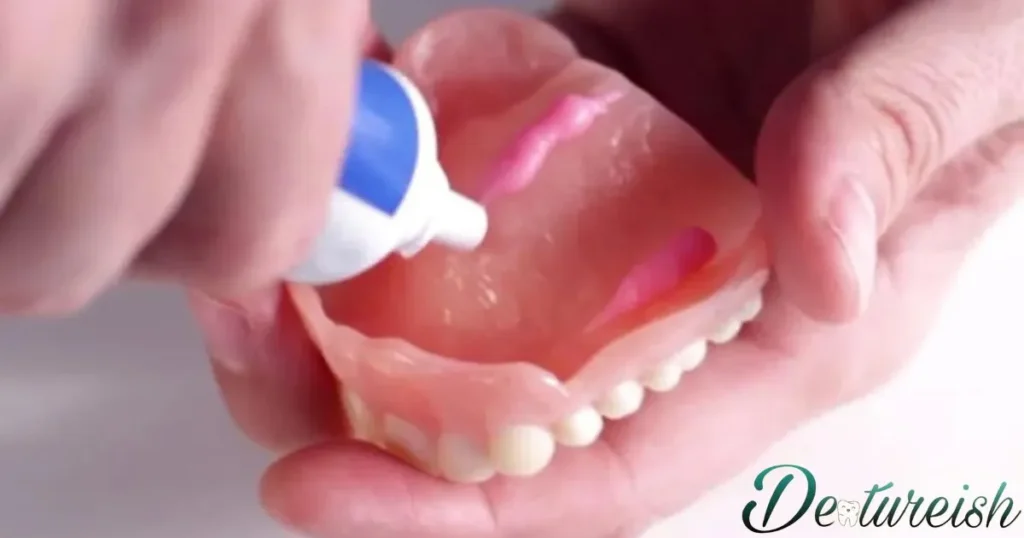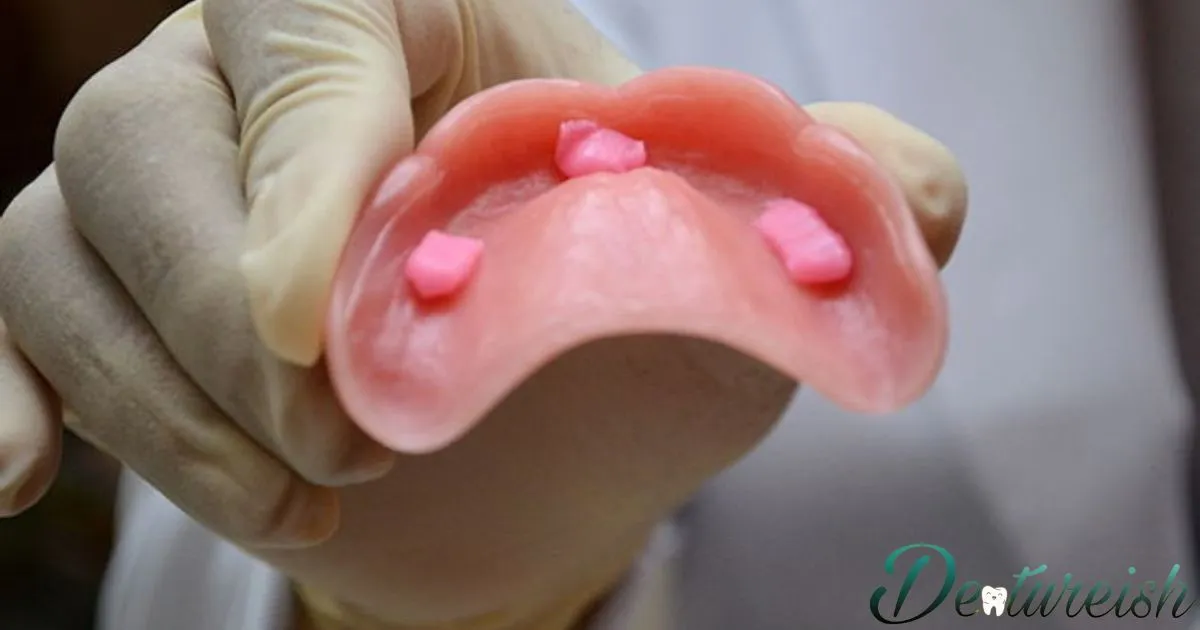Denture adhesive is used to help secure false teeth or dentures in place. Over time, excess adhesive can build up in the mouth, causing discomfort. Removing this adhesive takes some effort but can be done effectively at home.
How Do You Get Denture Adhesive Out Of Your Mouth? This is a common question for denture wearers who use adhesive to keep their false teeth in place. Excess adhesive left in the mouth can be annoying and needs to be cleaned out properly on a regular basis.
Getting denture adhesive out of your mouth completely can take some work. Using warm water and your fingers, you can remove leftover adhesive from places like the roof of your mouth, gums, and dentures. Special denture brushes and cleaners also help break down remaining adhesive residue for a fresher, cleaner feeling.
Understanding Denture Adhesives: What Are They?
Denture adhesives are pastes, powders or adhesive pads that can be applied to dentures to help them stay in place. They work by enhancing adhesion and coherence between the denture and oral tissues through saliva interaction, creating a sticky bond. Denture adhesives are commonly used by denture wearers and sometimes prescribed by dentists to improve retention, stability, chewing ability and comfort.
The Role of Denture Adhesives in Denture Wearing
When properly fitted, dentures generally should not require adhesives. However, they can help compensate for bone shrinkage over time that causes loosening. Adhesives also provide added confidence and security against slippage for some wearers. They additionally help seal out food debris. Excessive long-term use can cause health issues though.
Different Types of Denture Adhesives: Which One Are You Using?
Denture adhesives come in paste, powder or pad form. Pastes like Poligrip are commonly used. Powders that absorb moisture tend to be messier. Pads act as a double-sided sticky tape. Different ingredients are used, but zinc is added in some products to increase adhesion.
How Does Denture Adhesive Stick to Your Mouth?
Denture adhesive sticks to your mouth through a few key mechanisms:
- Reaction with Saliva: Denture adhesive reacts with saliva or water in your mouth to form a sticky substance that holds the denture in place.
- Bonding: When applied correctly, the adhesive bonds tightly to the denture and gum tissue, allowing for comfortable movement.
- Adherence and Coherence: Denture adhesive does a superior job of adhering to both the denture and the tissue, thereby improving retention. The coherence of denture adhesive is far greater than the coherence of saliva.
- Strong Bond: The adhesive creates a strong bond between the dentures and the gums, providing a comfortable fit and preventing them from slipping or moving.
| Mechanism | Description |
| Reaction with Saliva | Denture adhesive reacts with saliva or water in your mouth to form a sticky substance |
| Bonding | The adhesive bonds tightly to the denture and gum tissue |
| Adherence and Coherence | Denture adhesive adheres to both the denture and the tissue, improving retention. Its coherence is greater than that of saliva |
| Strong Bond | The adhesive creates a strong bond between the dentures and the gums, preventing slipping or moving |
Why Do You Need to Remove Denture Adhesive from Your Mouth?
Denture adhesive is a temporary fix to secure dentures firmly in your mouth, but it can leave a residue on your gums and dentures that can be difficult to clean. This residue can create an uncomfortable, sticky feeling in your mouth. For the benefit of your oral health, Get Plaque Off False Teeth dentures should be removed from the mouth at least six to eight hours in 24 hours for you to clean.
The Importance of Cleaning Denture Adhesive Residue
Cleaning denture adhesive residue is crucial to maintain oral hygiene. The adhesive residue can be difficult to remove, but it’s important not to damage your denture while attempting to remove it.
Some denture wearers find a soft brush with a little toothpaste rubbed over gums and the palate is effective. Others use mouthwash or warm salty water which loosens the glue and refreshes your mouth.
Can Denture Adhesive Residue Harm Your Mouth?
The search results do not provide direct information on whether denture adhesive residue can harm your mouth. However, it’s clear that the residue can create an uncomfortable, sticky feeling. It’s also implied that not removing the adhesive can interfere with the necessary cleaning of the dentures and mouth, which could potentially lead to oral health issues over time.
How Often Should You Clean Denture Adhesive from Your Mouth?
Dentures should be removed and cleaned at least once every 24 hours, and any adhesive residue should be cleaned off at this time. Some denture wearers find that the adhesive naturally loosens over the course of the day and can be easily removed at night.
What Happens If You Don’t Remove Denture Adhesive?
The search results do not provide specific information on the consequences of not removing denture adhesive. However, it’s implied that leaving adhesive residue can lead to discomfort and potentially interfere with oral hygiene practices. Regular cleaning of dentures and removal of adhesive is recommended for optimal oral health.
How to Get Denture Adhesive Out of Your Mouth: A Step-by-Step Guide

To remove denture adhesive, start by thoroughly rinsing your mouth with warm water or a warm salt water solution to help loosen the adhesive. You can also use a soft-bristled toothbrush, a washcloth, or a gloved hand to gently rub the adhesive off your gums and palate. Be patient and take your time to fully remove all residue.
Preparing Your Mouth for Denture Adhesive Removal
Before removing denture adhesive, prepare your mouth by thoroughly rinsing with warm water or a diluted salt water mixture. This will help loosen the adhesive to make it easier to remove. You may need to rinse several times.
Techniques for Removing Denture Adhesive from Your Mouth
Use a soft toothbrush, rough washcloth, or exfoliating glove to gently rub the adhesive off your gums and palate. Rub slowly and carefully to avoid damaging soft tissues. Rinse continuously with warm water while rubbing.
What Tools Can Help in Removing Denture Adhesive?
Soft-bristled toothbrushes, rough washcloths, exfoliating gloves, and warm salt water can all help remove denture adhesive. The abrasion from scrubbing plus the moisture from rinsing work together to dissolve adhesive.
Post-Removal Care: What to Do After Getting Denture Adhesive Out?
After removing all denture adhesive, rinse your mouth again with warm water. Brush gums and palate gently with a soft brush to remove any remaining residue. Rinse dentures as well before reinserting. Monitor for redness or irritation that could indicate tissue damage.
Common Mistakes When Removing Denture Adhesive: What to Avoid?
When removing denture adhesive, common mistakes include using ineffective methods and potentially damaging the mouth. Denture adhesive can be difficult to remove due to its adhesive properties, and often leaves a residue on gums and dentures, which can be uncomfortable and sticky.
Some people may resort to using abrasive substances like toothpaste on the denture’s surface, which can wear down the denture. Others may use excessive force while trying to remove the adhesive, which can potentially harm the gums and dentures.
Ineffective Methods of Denture Adhesive Removal
Ineffective methods of denture adhesive removal often involve the use of inappropriate tools or substances. For instance, using a regular toothbrush with toothpaste can be ineffective and potentially damaging to the dentures due to the abrasive nature of toothpaste. Similarly, relying on the adhesive to naturally loosen over the course of the day may not ensure complete removal of the adhesive, leaving behind residue.
Can You Damage Your Mouth While Removing Denture Adhesive?
Yes, it is possible to damage your mouth while removing denture adhesive. Using excessive force or inappropriate tools can potentially harm the gums and dentures. For instance, using a regular toothbrush with toothpaste can be abrasive and wear down the denture. It’s important to use gentle methods and appropriate tools to avoid causing damage.
How to Avoid Leaving Denture Adhesive Residue in Your Mouth?
To avoid leaving denture adhesive residue in your mouth, it’s important to thoroughly clean the dentures and gums. Rinsing the mouth with a mixture of salt and water, or using mouthwash, can help loosen the adhesive and clear away any remaining residue. Using a damp exfoliating glove to rub the glue off under warm running water can also be effective.
What Not to Do When Removing Denture Adhesive?
When removing denture adhesive, avoid using abrasive substances like toothpaste on the denture’s surface, as it can wear down the denture. Also, avoid using excessive force while trying to remove the adhesive, as it can potentially harm the gums and dentures. Instead, use gentle methods and appropriate tools, such as a damp exfoliating glove and warm water.
Professional Help for Denture Adhesive Removal: When to Seek It?
You should consult a dentist for help with denture adhesive removal if you are unable to adequately remove it yourself at home. Signs that professional help is needed include persistent adhesive residue or buildup on the dentures or gums despite your best efforts to remove it. This can lead to irritation, inflammation and other oral health issues.
When Should You Consult a Dentist for Denture Adhesive Removal?
Specifically, you should see your dentist if you experience redness, swelling, sores, pain or bad breath related to denture adhesive use. These can indicate infection or allergic reaction. Also seek help if the fit of your dentures has changed, making proper removal difficult. Ill-fitting dentures may need adjustment or replacement.
How Can Dentists Help in Removing Denture Adhesive?
Dentists have specialized equipment and solutions to thoroughly clean dentures and oral tissues. They can remove stubborn adhesive and identify any underlying issues causing poor denture fit or adhesive overuse. They may use a combination of manual scraping, ultrasonic cleaning and chemical solvents depending on the case.
Professional Denture Care: Beyond Adhesive Removal
In addition to removing adhesive, dentists can provide other important denture care services like relining or rebasing loose dentures, replacing worn dentures, treating oral infections, and advising on proper denture hygiene. While professional removal has a cost, preventing complications from improper adhesive use is invaluable.
Frequently Asked Question
How Can I Remove Denture Adhesive from My Mouth?
Gargling with warm salt water for 30 seconds can help loosen the seal of the adhesive.
What is an Effective Method to Remove Denture Adhesive from Gums?
Rinsing your mouth with a mixture of water and salt is a good method for removing denture adhesive from your gums.
Can I Use an Exfoliating Glove to Remove Denture Adhesive?
Yes, rubbing your gums with a damp exfoliating glove under warm running water can help remove denture adhesive.
Can Mouthwash Help in Removing Denture Adhesive?
Yes, using mouthwash can help loosen denture adhesive and rinse away the residue.
What Should I Do if I Can’t Remove Denture Adhesive from My Mouth?
If you’re unable to remove denture adhesive from your mouth, it’s recommended to contact your dental health professional for advice.
Conclusion
To remove excess denture adhesive from the mouth, first loosen the glue by swishing warm salt water around the gums and palate. Then gently brush the tissues using a soft toothbrush and toothpaste to clear adhesive residue.
Finish by thoroughly rinsing the mouth with water. Persistent adhesive in hard to reach areas can be removed by rubbing the tissues with a wet washcloth or soft glove. Combining mechanical cleaning methods like brushing and rubbing with solubilizing solutions like warm salt water and mouthwash works best to eliminate adhesive cling.
Take care not to scrub tissues aggressively. With some trial and error, denture wearers can find an effective, non-irritating approach to keep their mouths fresh and adhesive free. Being mindful not to over-apply these dental products makes removal easier as well.

